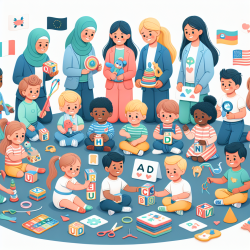French Immersion programs have long been celebrated for their effectiveness in bilingual education, particularly for majority language (MAJ.L.) children, those whose first language aligns with the community's predominant language. However, the impact of these programs on minority language (MIN.L.) children, whose first language is different from the community's, presents a complex but fascinating challenge. A study conducted by S. Davies delves into this very issue, offering insights that can significantly enhance the way educators approach language learning for MIN.L. children in French Immersion settings.
The research focuses on MIN.L. children enrolled in an early total French Immersion program within the Vancouver area. It contrasts the English language skills of these children with those of their MAJ.L. peers and MIN.L. children in all-English programs. The findings suggest that, contrary to concerns, MIN.L. children in French Immersion do not lag behind in English language skills. In fact, they perform comparably to MAJ.L. children in the same immersion programs and better than MIN.L. children in English-only programs.
This outcome underscores the importance of valuing and maintaining the first language and culture in the educational journey of MIN.L. children. The study posits that the initial equal footing in French, the language of instruction, eliminates feelings of inferiority among MIN.L. children, fostering a more inclusive and supportive learning environment. Furthermore, the positive attitudes towards the MIN.L. children's native culture and language within the French Immersion program contribute significantly to their success in acquiring English language skills.
For practitioners, this research highlights several key strategies for supporting MIN.L. children in French Immersion programs:
- Encourage a positive cultural and linguistic identity: Schools and educators should foster an environment where all languages and cultures are respected and valued. This includes celebrating cultural diversity and encouraging students to use their first language within the school setting.
- Provide equitable support: Ensure that MIN.L. children receive the same level of support as their MAJ.L. peers, including access to resources in their first language, if possible.
- Engage parents and communities: Schools should work closely with the families of MIN.L. children and the wider community to maintain the children's linguistic and cultural heritage. This can include community language classes or cultural events.
- Implement pedagogical approaches that value bilingualism: Teaching strategies should recognize the benefits of bilingualism and build on the linguistic strengths that MIN.L. children bring to the classroom.
Ultimately, the study by Davies suggests that French Immersion can be a highly effective educational approach for MIN.L. children, provided their cultural and linguistic identities are embraced and nurtured. As educators, embracing these findings can help us create more inclusive, supportive, and effective learning environments for all students.
To delve deeper into this research and its implications for language learning in French Immersion programs, please follow this link: English Language Skills of Minority Language Children in a French Immersion Program.










